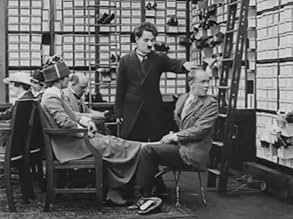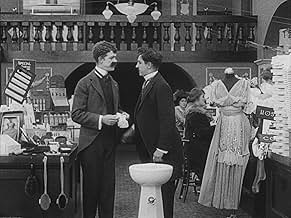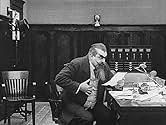IMDb RATING
6.6/10
2.8K
YOUR RATING
The Tramp is tricked into impersonating an embezzling floorwalker in a department store.The Tramp is tricked into impersonating an embezzling floorwalker in a department store.The Tramp is tricked into impersonating an embezzling floorwalker in a department store.
- Director
- Writers
- Stars
Henry Bergman
- Old Man
- (uncredited)
Frank J. Coleman
- Janitor
- (uncredited)
Fred Goodwins
- Shoe clerk
- (uncredited)
Bud Jamison
- Small Role
- (uncredited)
Tom Nelson
- Detective
- (uncredited)
Wesley Ruggles
- Policeman
- (uncredited)
- Director
- Writers
- All cast & crew
- Production, box office & more at IMDbPro
Featured reviews
There are some good moments in "The Floorwalker" that make up for the more routine parts. Chaplin gets good mileage out of an identity mix-up - a theme he always liked - and he also has some good slapstick moments with Eric Campbell, one of his best supporting actors. The plot is mostly goofy, serving mainly as an excuse to allow the characters to chase each other around the store. Overall, it's about average for a Chaplin short feature, which makes it pretty good by most other standards.
The Little Tramp is mistaken for an embezzling floorwalker. Charlie Chaplin's first film for Mutual, and the first ever to feature an escalator, which provides the comical maestro with plenty of funny material to mine. The lookalike actor who plays the crooked store employee with whom Chaplin exchanges identities is Lloyd Bacon, who would go on to direct almost 100 movies including 42nd Street and Footlight Parade. The Floorwalker is a decent enough entry on Chaplin's CV, but it would have benefited from being 10 minutes shorter - the middle section drags a little - and it ends rather abruptly, suggesting that the final scenes have been lost.
Although Charlie Chaplin made some great short comedies in the late 1910's, others don't quite make it. Examples like His New Job and Shanghaied come to mind, and I would also The Floorwalker in this category.
Charlie gets mistaken for a manager of a department store (and vice versa). This manager tries to steal money from the cash register and make a run for it, and Charlie is just an honest costumer but getting blamed for some missing objects, stolen by other costumers.
There aren't many laughs in it, except for the last couple of minutes or so with some great scenes on the escalator. For the rest, quite disappointing.
4/10.
Charlie gets mistaken for a manager of a department store (and vice versa). This manager tries to steal money from the cash register and make a run for it, and Charlie is just an honest costumer but getting blamed for some missing objects, stolen by other costumers.
There aren't many laughs in it, except for the last couple of minutes or so with some great scenes on the escalator. For the rest, quite disappointing.
4/10.
So evidently the floorwalker is the guy that walks around the store making sure no one is shoplifting, which provides a wonderful situation for a little mixed identity. Chaplin plays an obnoxious browser, testing all of the products in the store and generally making a big mess without buying anything (this may be one of the few times in his career when he displayed a little understanding of the plight of the store owners dealing with pesky shoppers who don't buy anything). Soon, however, he is back to sticking up for the people. The floorwalker begins harassing Charlie while a real thief robs the place blind right behind him.
There are two new and interesting things in this film. One is the escalator, which I have a feeling is the first escalator ever to appear in a motion picture (if you know of an earlier one, I'd be curious to hear about it), and the other is a Chaplin look-a-like. He's much bigger than the diminutive Chaplin, of course, but it's the first time I've seen his double appear with him in one of his movies.
The escalator is well used here, as well. The humor surrounding it goes a long way, and Chaplin speed walking down it is one of the more memorable moments of his early career. Soon, the double, in his efforts to make off with a suitcase full of cash, pays Charlie to trade clothes with him (I am always suspicious of someone who wants me to wear their clothes out of a store), which Charlie foolishly accepts.
The set up for the physical comedy is unusually clever in this film. The real bad guy gets caught and Charlie is congratulated for helping to capture him, then later an oafish guard wakes up (he had fallen victim to that silent film curiosity where someone gets knocked out and then later wakes up as though well-rested from a deep sleep), and comes after Charlie, unaware of his new hero status. He gives Charlie a hilarious thrashing.
My favorite moment in the film is Charlie's brief farewell dance before he attempts to dive into that handbag. It reminds me of the prestidigitonious (something like that) scene in Sword in the Stone, one of my all time favorite animated films.
There is a great scene near the end where Charlie does a hilarious little dance. It's hard to pinpoint it, but there is something definitely charming about the way he dances. I feel like I've seen a thousand other people do the same thing, and yet it still looks totally unique when he does it. The ending of this film is a little abrupt, but this is probably some of his best physical comedy yet.
There are two new and interesting things in this film. One is the escalator, which I have a feeling is the first escalator ever to appear in a motion picture (if you know of an earlier one, I'd be curious to hear about it), and the other is a Chaplin look-a-like. He's much bigger than the diminutive Chaplin, of course, but it's the first time I've seen his double appear with him in one of his movies.
The escalator is well used here, as well. The humor surrounding it goes a long way, and Chaplin speed walking down it is one of the more memorable moments of his early career. Soon, the double, in his efforts to make off with a suitcase full of cash, pays Charlie to trade clothes with him (I am always suspicious of someone who wants me to wear their clothes out of a store), which Charlie foolishly accepts.
The set up for the physical comedy is unusually clever in this film. The real bad guy gets caught and Charlie is congratulated for helping to capture him, then later an oafish guard wakes up (he had fallen victim to that silent film curiosity where someone gets knocked out and then later wakes up as though well-rested from a deep sleep), and comes after Charlie, unaware of his new hero status. He gives Charlie a hilarious thrashing.
My favorite moment in the film is Charlie's brief farewell dance before he attempts to dive into that handbag. It reminds me of the prestidigitonious (something like that) scene in Sword in the Stone, one of my all time favorite animated films.
There is a great scene near the end where Charlie does a hilarious little dance. It's hard to pinpoint it, but there is something definitely charming about the way he dances. I feel like I've seen a thousand other people do the same thing, and yet it still looks totally unique when he does it. The ending of this film is a little abrupt, but this is probably some of his best physical comedy yet.
A floorwalker, Lloyd Bacon, and manager, Eric Campbell, rob the safe of a department store. Before they can leave with their ill-gotten gains, the floorwalker knocks the manager out and steals his share. To evade detectives, the floorwalker induces a look-alike tramp, Charlie Chaplin, to trade places with him. When the detectives arrest the real floorwalker, Chaplin is left with a suitcase of money and one small problem: Eric wants the money and revenge.
"The Floorwalker" was the first of Chaplin's twelve two-reel films for the Mutual Company. These are perhaps the best series of two-reel silent comedies. Chaplin made great strides as film maker during this period, and laid the groundwork for his feature-length triumphs to come.
The difference between the Mutual films and his Essanay films of the previous year are obvious from the start. The technical quality of the film making in almost all categories increases, and, although there are some notable holdovers from Essanay, especially leading- lady Edna Purviance, the quality of his stock company at Mutual also improves. "The Floorwalker" gives us the debut of Eric Campbell, Chaplin's best heavy, and Albert Austin, another stalwart foil. Most importantly, the level of humor rises from the rough, knockabout slapstick of his earliest films.
"The Floorwalker" is more heavily-plotted than most of his earlier shorts. It uses Chaplin's common plot device of mistaken identity which he frequently employed from 1914's "Caught in a Cabaret" to 1940's "The Great Dictator." This device allowed his tramp "everyman" to get a taste of the lifestyle of the rich and stuffy. This time he doesn't reach as high - merely to the ranks of the employed. The gags are good, in particular Chaplin makes excellent use of an escalator, although the film isn't as funny as many that will soon follow. Still, "The Floorwalker" remains one of my favorite Mutuals, if only for the sentimental reason that it was the first full-length two- reeler I bought in Super 8mm when I was a kid.
Well worth a look, but not the best introduction to Chaplin.
"The Floorwalker" was the first of Chaplin's twelve two-reel films for the Mutual Company. These are perhaps the best series of two-reel silent comedies. Chaplin made great strides as film maker during this period, and laid the groundwork for his feature-length triumphs to come.
The difference between the Mutual films and his Essanay films of the previous year are obvious from the start. The technical quality of the film making in almost all categories increases, and, although there are some notable holdovers from Essanay, especially leading- lady Edna Purviance, the quality of his stock company at Mutual also improves. "The Floorwalker" gives us the debut of Eric Campbell, Chaplin's best heavy, and Albert Austin, another stalwart foil. Most importantly, the level of humor rises from the rough, knockabout slapstick of his earliest films.
"The Floorwalker" is more heavily-plotted than most of his earlier shorts. It uses Chaplin's common plot device of mistaken identity which he frequently employed from 1914's "Caught in a Cabaret" to 1940's "The Great Dictator." This device allowed his tramp "everyman" to get a taste of the lifestyle of the rich and stuffy. This time he doesn't reach as high - merely to the ranks of the employed. The gags are good, in particular Chaplin makes excellent use of an escalator, although the film isn't as funny as many that will soon follow. Still, "The Floorwalker" remains one of my favorite Mutuals, if only for the sentimental reason that it was the first full-length two- reeler I bought in Super 8mm when I was a kid.
Well worth a look, but not the best introduction to Chaplin.
Did you know
- TriviaThis film was noted for the first "running staircase" (escalator) used in films.
- GoofsThe bag with the money goes up the escalator and remains upstairs. It is always seen in the background until the women enters the scene. Whenever she is in the shot, the moneybag disappears.
- Alternate versionsKino International distributes a set of videos containing all the 12 Mutual short films made by Chaplin in 1915 - 1917. They are presented by David Shepard, who copyrighted the versions in 1984, and has a music soundtrack composed and performed by Michael Mortilla who copyrighted his score in 1989. The running time of this film is 24 minutes.
- ConnectionsEdited into The Chaplin Cavalcade (1941)
Details
- Release date
- Country of origin
- Official sites
- Languages
- Also known as
- Shop
- Filming locations
- Production company
- See more company credits at IMDbPro
- Runtime
- 29m
- Color
- Sound mix
- Aspect ratio
- 1.33 : 1
Contribute to this page
Suggest an edit or add missing content




































